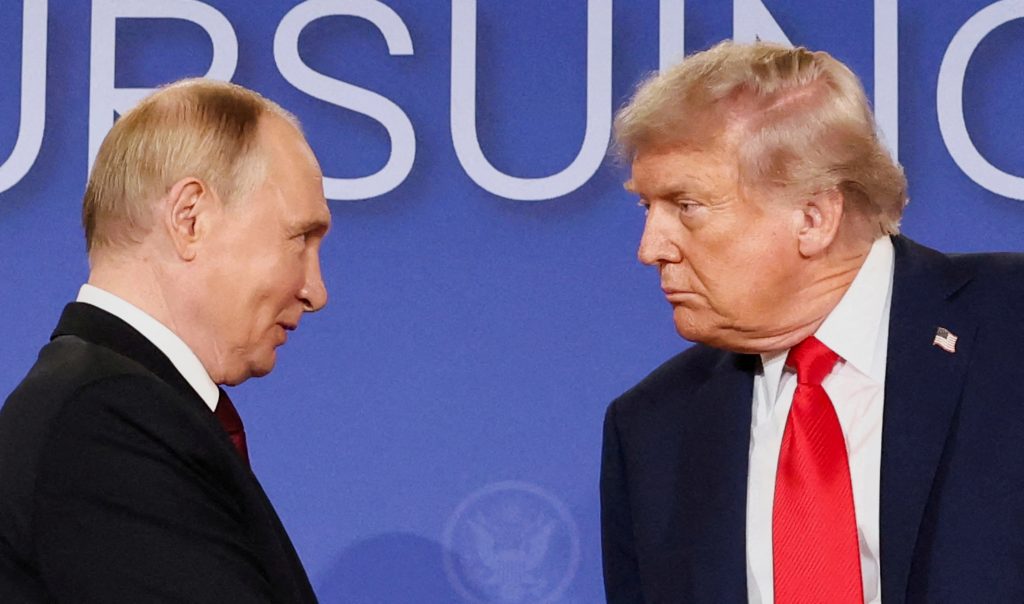Trump’s Stark Warning to Putin Amid the Ukraine Conflict
In a recent press conference, U.S. President Donald Trump issued a pointed warning to Russian President Vladimir Putin regarding the ongoing conflict in Ukraine, emphasizing that the U.S. would respond decisively if dissatisfied with Putin’s decisions. During his remarks alongside Polish President Karol Nawrocki, Trump articulated the gravity of the situation, noting the tragic loss of lives caused by the war and emphasizing the need for a resolution.
Context of the Warning
Trump remarked that he was awaiting Putin’s decisions regarding the conflict. “He knows where I stand and he’ll make a decision one way or another. Whatever his decision is, we’ll either be happy or unhappy about it,” he stated. This ultimatum underscores the tension rising not just in the affected regions of Ukraine but also in the broader geopolitical landscape, where U.S.-Russia relations remain precarious.
Putin’s Response and Stalled Peace Talks
In conjunction with Trump’s remarks, Putin expressed a willingness to meet Ukrainian President Volodymyr Zelensky in Moscow, marking a potential thaw in stalled peace talks that have seen little progress since an earlier summit in Alaska. At a press conference in Beijing, Putin indicated that, should “common sense prevail,” there could be a resolution to the ongoing violence. He acknowledged a “sincere desire” from Trump to find a settlement, suggesting that diplomatic discussions could still hold promise.
Military Options on the Table
However, the Kremlin’s stance remains unwavering concerning its military ambitions. Putin warned that if peace agreements are not reached, Russia would achieve its objectives through military means. "If not, then we will have to resolve all our tasks militarily,” he said, reinforcing the notion that Russia is prepared to intensify its military operations if negotiations falter.
Tragedy Strikes in Lisbon
In a separate but equally poignant update, Ukrainian President Volodymyr Zelensky extended condolences to Portugal following a deadly accident involving an electric streetcar in Lisbon. The tragedy claimed 15 lives and left 18 others injured, casting a shadow over the city and serving as a reminder of the unpredictability of life amid ongoing global turmoil. Zelensky’s heartfelt message to the Portuguese people highlights the interconnectedness of nations and leaders, particularly during crises.
The Broader Geopolitical Landscape
As the situation develops, the backdrop of international relations remains complex. China’s Xi Jinping, in a recent military parade, emphasized choices facing humanity: peace or conflict, cooperation or rivalry. His comments, made alongside Putin and North Korea’s Kim Jong Un, present a stark view of the divided global landscape, revealing contrasting approaches to diplomacy and international order.
In parallel, the German government is actively seeking India’s help to bring Russia back to the negotiating table, underscoring the necessity of involving neutral parties in the resolution process. German Foreign Minister Johann Wadephul’s outreach to India reflects the intricate web of alliances and the varied interests at play in the conflict.
Ukraine’s Counterclaims Against Russian Advancements
On the ground in Ukraine, military officials have denied Russian claims of significant territorial gains in Kupiansk, emphasizing the ongoing intensity of the conflict. According to Ukraine’s military leaders, Russian advances are largely exaggerated and primarily a part of ongoing propaganda efforts. This highlights the psychological warfare that accompanies the physical conflict, with both sides seeking to control the narrative in an increasingly polarized media landscape.
Future Security Discussions
Looking forward, a coalition of Ukrainian allies is set to convene, aimed at discussing security guarantees for Ukraine if a ceasefire is eventually agreed upon. This gathering, involving leaders from Europe, Australia, and beyond, seeks to reaffirm commitment levels and outline military contributions to deterring potential future attacks.
Conclusion
The current interplay of diplomatic posturing, military readiness, and humanitarian concerns encapsulates the multifaceted dynamics of the Ukraine conflict. As leaders like Trump, Putin, Zelensky, and Xi navigate this treacherous terrain, the outcomes remain uncertain, with each moment underscored by the potential for escalation or de-escalation in a deeply divided world.

